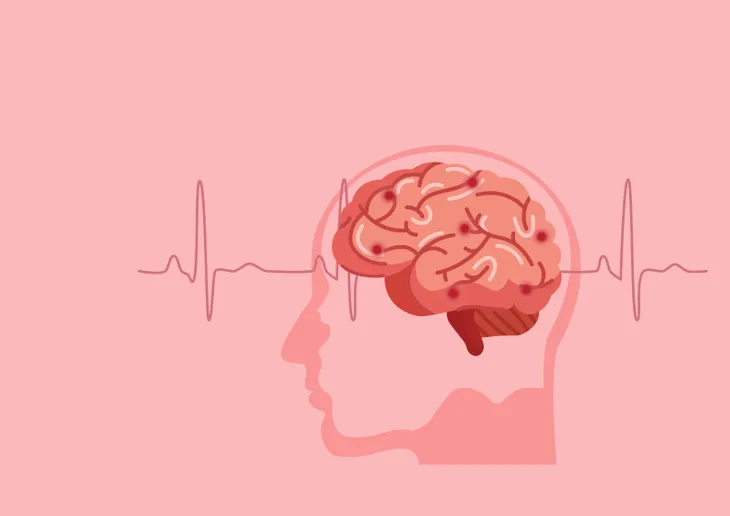- Brain fatigue occurs when your brain receives too much stimulation without rest.
- There are a variety of emotional, physical and behavioural symptoms of brain fatigue.
- Brain fatigue can affect our performance, but there are many techniques available to manage and prevent it.
It’s not uncommon to feel exhausted after an intense day of thinking. Whether it be from problem solving, organizing, or planning, it’s valid to feel mentally drained at the end of a long day. Turns out, there’s a very real reason behind why working and thinking too hard makes us tired.
There are a variety of emotional, physical, and behavioral symptoms of brain fatigue, and it’s important to be aware of these symptoms so we can know how to manage and prevent them. Brain fatigue can be difficult to differentiate from stress and physical fatigue, but there are some differentiating factors that make them unique. Follow along as we breakdown everything you should know about brain fatigue, including the science behind what causes it, the symptoms you should know, and tips to manage it.
What is Brain Fatigue?
Brain fatigue occurs when your brain receives too much stimulation or periods of intense activity without rest, according to Healthline. Brain fatigue has also been called mental exhaustion or mental fatigue. It’s common to feel physically fatigued after a period of intense work, but the same thing can happen to our mind and affect our ability to think, problem solve, and process emotions.
We often experience feelings of brain fatigue after working or studying for a long period of time with no breaks, spending time dealing with overwhelming responsibilities, or devoting a lot of mental energy to thinking through stressful scenarios.
 Shutterstock/fizkes
Shutterstock/fizkesWhat Causes Brain Fatigue?
Brain fatigue can happen for a variety of reasons but often occurs when you engage in tasks that require a lot of mental and emotional effort without rest. Triggers and causes for brain fatigue can vary by person, but there are some common causes.
Many people may experience brain fatigue when they have a high-stress or demanding job, work long hours without rest, experience financial stress, provide care for someone whose ill, experience chronic illness or a mental health condition, lack work-life balance, lose a loved one, or have a baby.
 Shutterstock/TypoArt BS
Shutterstock/TypoArt BSThe Science Behind Brain Fatigue
There’s actually a very real reason behind why we feel fatigued after a long day of thinking. The Huffington Post gathered information from studies that researched why machines can compute continuously, but the brain cannot. The studies revealed that when intense cognitive effort is prolonged for several hours, it causes toxic byproducts to build up in the prefrontal cortex of the brain.
In turn, this affects your control when it comes to decision-making. Your brain essentially decides that it cannot exude any further effort and will favor what researchers deem “low-cost actions,” which are actions that require minimal effort.
Emotional Symptoms of Brain Fatigue
Brain fatigue can manifest in a variety of ways whether it be emotional, physical or behavioral. When it comes to emotional symptoms, some telltale signs of brain fatigue include feeling less alert and finding it difficult to focus, according to Healthline.
A few other common emotional symptoms include feelings of depression, lingering feelings of anxiety, a sense of detachment, anger, irritability, difficulty managing emotions, a sense of dread, decline in motivation, feeling lethargic, and difficulty concentrating.
 Shutterstock/fizkes
Shutterstock/fizkesPhysical Symptoms of Brain Fatigue
Brain fatigue can actually show itself through physical symptoms as well. You may be experiencing symptoms that don’t have a clear cause, but could be associated with feeling mentally fatigued.
Some common physical symptoms of brain fatigue to be aware of include a general sense of feeling unwell, frequent illness, head and body aches, upset stomach, and changes in appetite. Those who are experiencing brain fatigue may also experience a variety of sleep issues such as chronic fatigue, drowsiness, and insomnia.
Behavioral Symptoms of Brain Fatigue
Brain fatigue can also be evident in the way we behave, especially if you are experiencing ongoing mental exhaustion. Healthline explains that you may find yourself procrastinating tasks at school, work or around the house. You may also notice a decline in your performance at work or school.
Some other common behavioral symptoms include drinking alcohol or taking drugs to manage symptoms, avoiding people you typically enjoy spending time with, or feeling irritable or distracted around others. You may also have difficulty managing your responsibilities or following through on commitments.
 Shutterstock/DimaBerlin
Shutterstock/DimaBerlinStress vs. Brain Fatigue
It can be challenging to differentiate true brain fatigue from stress. Everyone has experienced stress at some point in their life, and it’s a normal reaction to new, or overwhelming situations. According to Healthline, stress is the result of a surge in hormones, including adrenaline and cortisol, that helps you respond to high-pressure situations.
Often when you address the stressor, your body’s hormones will return to its normal levels. If your body is experiencing chronic or long-term stress, however, it may eventually manifest into brain fatigue. If you continue to face a challenge or a set of challenges that activates your stress response, your cortisol levels will remain high. This may interfere with your body’s ability to complete normal processes such as digestion and sleep since your brain does not have enough time to rest and reset.
Physical Exhaustion vs. Brain Fatigue
Brain fatigue and physical exhaustion can play off each other. It’s common to feel physical fatigue after an intense workout, when you get several nights of low quality sleep, if you have a physically demanding job or during an illness.
If you’re dealing with physical or mental exhaustion, it’s likely that you may start to notice the other, according to Healthline. For example, on a day where you feel that your body is tired, you likely also feel that your brain isn’t operating as sharp as usual. On the other side of things, if you feel mentally exhausted, you may not have the motivation to exert yourself in an activity that is physically demanding or requires endurance.
 Shutterstock/wavebreakmedia
Shutterstock/wavebreakmediaBrain Fatigue and Performance
Brain fatigue has a direct effect on your performance whether it be at work, school or in your personal life. Long-term brain fatigue could put any of these at risk, so it’s important to understand the relationship between the two and how to manage brain fatigue.
When it comes to your performance at work, chronic brain fatigue may result in a decline in productivity and low engagement. You may find it difficult to concentrate or feel less engaged in your professional goals. This lack of motivation can also translate to your personal life when it comes to responsibilities and even simple tasks. The result may be an overall feeling of dissatisfaction in both the workplace or your personal life.
 Shutterstock/fizkes
Shutterstock/fizkesManaging Brain Fatigue
With all that being said, if you are feeling the signs and symptoms of brain fatigue, there are many strategies available to manage symptoms. The first strategy is to remove the stressor. While this isn’t always possible if work is causing your brain fatigue, you could consider talking with your supervisor about how you’re feeling and try delegating some of your responsibilities to others.
Another way to manage brain fatigue is to take a break to reset and recharge. A break could be a vacation, clearing your schedule of nonessential tasks for a weekend, or leaving the office for an hour at lunch. Other ways to manage brain fatigue include learning relaxation techniques such as meditation, massage, or yoga. It may also be helpful to aim to get more sleep, write in a gratitude journal, or incorporate more exercise into your routine.
 Shutterstock/Kite_rin
Shutterstock/Kite_rinBrain Fatigue Prevention
If you’re prone to experiencing brain fatigue, it’s important to be aware of strategies to prevent it from happening. Brain fatigue can happen to anyone at anytime, but knowing how to prevent it can help in the long-run in your quality of life and happiness.
Healthline explains that taking regular time off when you start to feel depleted can really help, whether it be a short vacation or a single mental health day off. It’s also important to prioritize self-care and to make it a part of your weekly, or daily, routine. Self-care is different for everyone, but can include rest, exercise or activities you find enjoyable. Knowing your limits is key when it comes to brain fatigue. Be sure to take time to rest when you’re sick, and know when to say “no” when you’re at capacity or feeling overwhelmed.
When to Contact a Doctor
If you’re having difficulty managing or preventing brain fatigue, it may be time to contact a doctor. Brain fatigue can lead to a range of physical and mental health consequences and it is best to take action sooner rather than later.
If you’ve noticed any of the physical, emotional or behavioural symptoms of brain fatigue, a mental health professional can help support you while processing your feelings. Healthline explains that they can also help you identify causes and triggers, learn helpful ways to cope and explore treatment options for long-term relief.
 Shutterstock/wavebreakmedia
Shutterstock/wavebreakmedia






